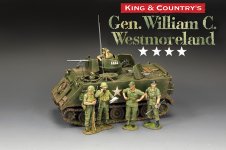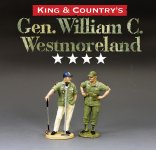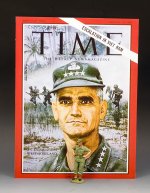King & Country
Captain
- Joined
- May 23, 2005
- Messages
- 5,015
Hi Guys,
Here is an advance preview of one of our most important ‘Vietnam’ figures… General William C. Westmoreland, Commander of the Military Assistance Command, Vietnam (MACV) from 1964-1968.
Westmoreland had been appointed to that position by President Lyndon B. Johnson and his Secretary of Defense Robert McNamara who both believed that this senior officer was ‘the best we have, without question!’
As the head of MACV, Westmoreland adopted a strategy of attrition against the Viet Cong and North Vietnamese Army, attempting to drain them of manpower and supplies by using the United States overwhelming superiority in both artillery and air power.
To help achieve this General Westmoreland expanded American forces in South Vietnam from just over 20,000 men (mostly military advisers) in 1964 to a major ground force of over 535,000 by 1968.
As the war in Vietnam grew so too did the opposition to it develop back in American itself.
Nevertheless general public support for the troops themselves remained relatively strong until the eruption of the TET Offensive at the end of January 1968.
Although shaken and in some cases surprised by the VC and NVA attacks throughout South Vietnam, American and Allied forces, under Westmoreland’s command, soundly defeated and decimated their communist opponents virtually everywhere.
The damage however had been done and the American media almost entirely focused on the few enemy successes and much less on the overall victory of the U.S. and South Vietnamese forces.
By now Washington had decided that a new Commander of MACV should be appointed and General Creighton Abrams would take over from Westmoreland.
However, in the way of such moves, General Westmoreland was not demoted or retired but actually promoted to ‘Chief of Staff of the United States Army’ and as such continued to serve until his retirement in 1972.
With the advantage of hindsight it’s possible that no American military commander could have achieved victory in South Vietnam especially with all the many restrictions imposed by Washington and also the intransigence of the North Vietnamese and their ability to absorb much greater military and civilian casualties than the U.S.
That being said, William C. Westmoreland enjoyed a long and mostly distinguished career in the American military and played an important role in the story of the Vietnam War and for that he should be remembered… even in miniature.
All the best and have an excellent weekend!
Andy



Here is an advance preview of one of our most important ‘Vietnam’ figures… General William C. Westmoreland, Commander of the Military Assistance Command, Vietnam (MACV) from 1964-1968.
Westmoreland had been appointed to that position by President Lyndon B. Johnson and his Secretary of Defense Robert McNamara who both believed that this senior officer was ‘the best we have, without question!’
As the head of MACV, Westmoreland adopted a strategy of attrition against the Viet Cong and North Vietnamese Army, attempting to drain them of manpower and supplies by using the United States overwhelming superiority in both artillery and air power.
To help achieve this General Westmoreland expanded American forces in South Vietnam from just over 20,000 men (mostly military advisers) in 1964 to a major ground force of over 535,000 by 1968.
As the war in Vietnam grew so too did the opposition to it develop back in American itself.
Nevertheless general public support for the troops themselves remained relatively strong until the eruption of the TET Offensive at the end of January 1968.
Although shaken and in some cases surprised by the VC and NVA attacks throughout South Vietnam, American and Allied forces, under Westmoreland’s command, soundly defeated and decimated their communist opponents virtually everywhere.
The damage however had been done and the American media almost entirely focused on the few enemy successes and much less on the overall victory of the U.S. and South Vietnamese forces.
By now Washington had decided that a new Commander of MACV should be appointed and General Creighton Abrams would take over from Westmoreland.
However, in the way of such moves, General Westmoreland was not demoted or retired but actually promoted to ‘Chief of Staff of the United States Army’ and as such continued to serve until his retirement in 1972.
With the advantage of hindsight it’s possible that no American military commander could have achieved victory in South Vietnam especially with all the many restrictions imposed by Washington and also the intransigence of the North Vietnamese and their ability to absorb much greater military and civilian casualties than the U.S.
That being said, William C. Westmoreland enjoyed a long and mostly distinguished career in the American military and played an important role in the story of the Vietnam War and for that he should be remembered… even in miniature.
All the best and have an excellent weekend!
Andy




